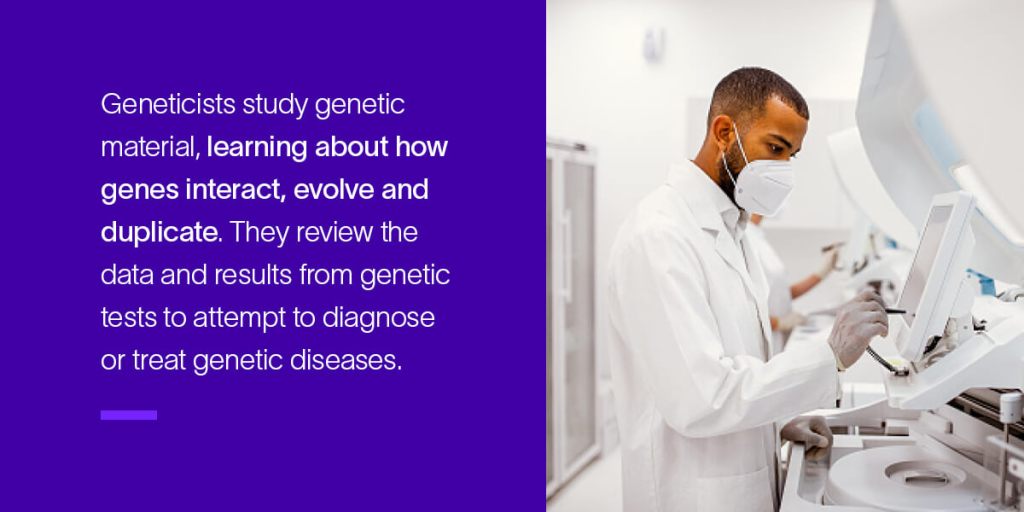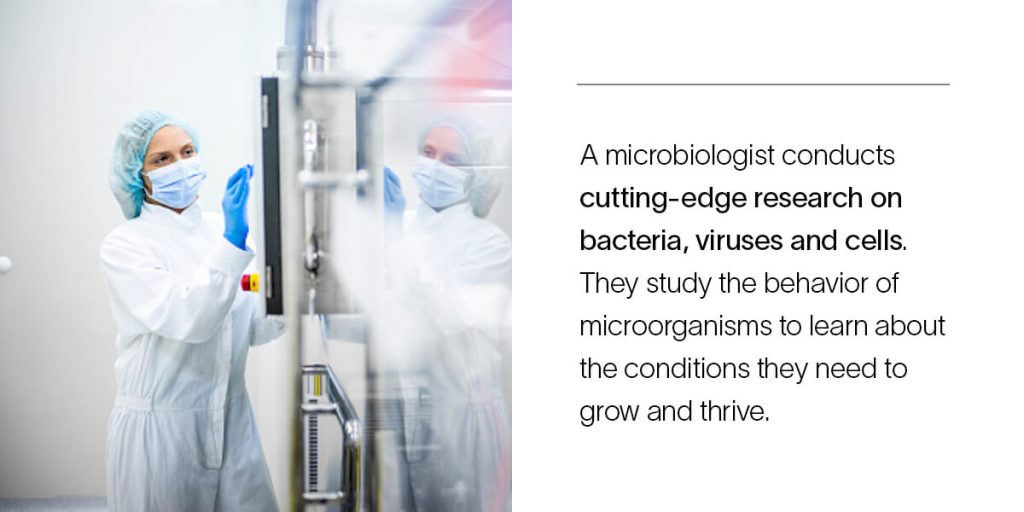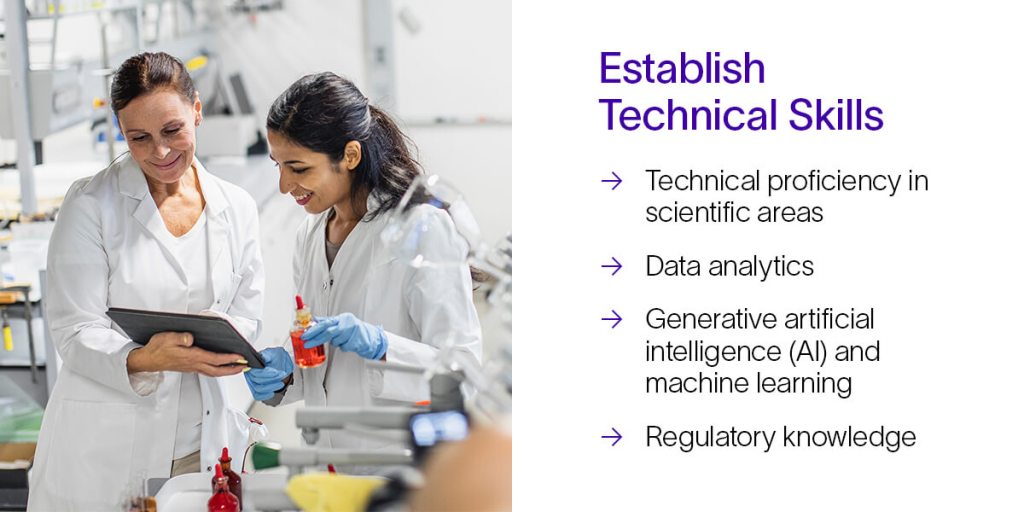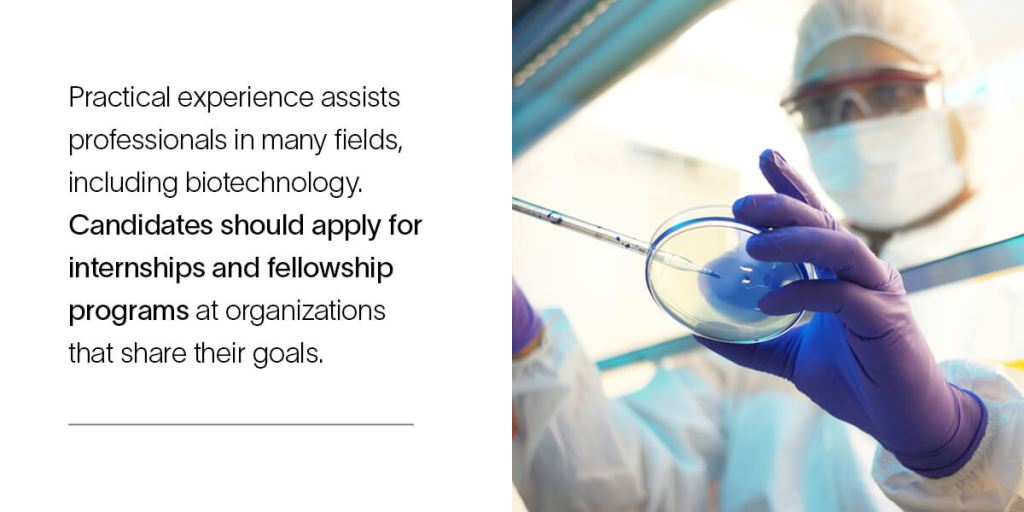The biotechnology field continues expanding as more people realize its potential to create life-changing solutions. Precedence Research calculated the global biotechnology market at $1.55 trillion in 2024 and predicted it to reach around $4.25 trillion by 2033. Consumer shifts toward personalized medicine, research and development (R&D) projects, and rising chronic prevalence drive much of this growth.
Those seeking a biotechnology career path have much to look forward to, including driving innovation and changing lives. There has never been a better time to enter this pioneering career. Aspiring professionals should be well-versed in the field to make the best decisions for their careers.
Table of Contents
- Why Choose a Career in Biotechnology?
- Biotechnology Career Outlook
- Biotechnology Career Salary
- 15 Biotechnology Career Paths to Consider
- How to Start a Career in Biotechnology
- Search Available Biotechnology Jobs
Why Choose a Career in Biotechnology?

Biotechnology is a good career path with the potential for a vast global impact. It plays a vital role in innovation, as biotechnologists help develop new treatments and technologies that can potentially change lives. They help further gene therapy, personalized medicine, drug development, and other advancements that have transformed healthcare.
Biotechnologists innovate cures and enhance patient quality of life. They can also develop scientific advancements in genetics, agriculture, biology, environmental protection and biochemistry. Biotechnology professionals can find fulfilling careers in the government or private sectors.
Some of the many benefits of pursuing a career in biotechnology include:
- Ongoing learning and innovation: R&D in biotechnology advances rapidly. New tools, technologies and methodologies continue to emerge. Biotechnology professionals exist at the forefront of innovation. They learn and acquire new skills as they work on various projects.
- Many career opportunities: The biotechnology industry provides many opportunities for varied career paths with different levels of specialization.
- Collaboration and teamwork: Professionals work with an array of experts, each with specialized knowledge. Considering different viewpoints leads to higher productivity and innovation, allowing people to push the boundaries of possibility.
- Geographic freedom: Job openings in biotechnology occur throughout the country and the world, allowing professionals to travel and settle in the location of their choice.
Biotechnology Career Outlook
Employment for biotechnology professionals increased by an average of 5.3% over the five years between 2018 and 2023. Individuals looking for stability and who prioritize advancement opportunities when choosing a career may find a good fit in the biotechnology industry.

Biotechnology evolves rapidly, offering significant opportunities for career advancement. In addition to participating in pioneering work, biotechnology professionals can enjoy job stability. The increasing demand for biotechnology across industries means companies must expand, invest in R&D and hire talented professionals to meet their evolving needs.
Biotechnology Career Salary
Biotechnology professionals solve some of the world’s most significant challenges. The average pay for biotechnology professionals in the U.S. varies depending on the location and role, with several top-paying jobs paying more than $100,000. Significant advancement opportunities exist based on skill level, location and years of experience.
The field’s rapid growth and demand for skilled professionals encourage organizations to provide attractive compensation packages to attract and retain top talent.
15 Biotechnology Career Paths to Consider
Job applicants with the right skills and experience can pursue several roles. Explore some in-demand biotechnology career options.
1. Biotechnologist
These highly qualified scientists combine biological research and technology. They develop products and technologies that improve various fields, including agriculture and medicine. Biotechnologists operate in many roles, including manufacturing, R&D and quality assurance. They can work with specific organisms or specialize in an industry. Many work in a laboratory setting or collect samples in the field.
2. Geneticist

Geneticists study genetic material, learning about how genes interact, evolve and duplicate. They review the data and results from genetic tests to attempt to diagnose or treat genetic diseases. They work in a highly technical scientific field, conducting laboratory research or practicing medicine.
3. Biomedical Engineer
This biotechnology engineering career involves applying biology and medical science. Professionals will design and create technologies, devices, systems and software to solve health care problems. Their efforts improve patients’ lives and significantly impact overall health care, enhancing diagnosis and treatment of diseases. They develop life-changing medical devices, including pacemakers and immunotherapy injections.
4. Research Scientist
Professionals in biotechnology research and development careers conduct research within their specific field or discipline. Research scientists primarily design, plan and execute experiments to solve problems and develop new technologies. They remain at the forefront of advancing scientific knowledge and driving discovery.
5. Biochemist
Biochemists study the chemical properties of living things, including cell development, growth, heredity and disease. They conduct complex, groundbreaking research projects, often isolating, analyzing and synthesizing molecules. They also research the effects of hormones, drugs and nutrients on tissues. These dedicated professionals change lives, developing products and processes that improve human health.
6. Microbiologist

A microbiologist conducts cutting-edge research on bacteria, viruses and cells. They study the behavior of microorganisms to learn about the conditions they need to grow and thrive. Microbiologists also design and conduct experiments to develop vaccines and treatments for illnesses. Some also perform biotechnical research on the impact of microorganisms on human life.
7. Process Engineer
Process engineers design, implement, optimize and manage industrial processes. Their primary goal involves improving efficiency, quality and safety in manufacturing or production. They work in many industries, including biotechnology and pharmaceuticals. Their contributions help keep products sustainable, compliant and efficient.
8. Zoologist or Wildlife Biologist
Zoologists and wildlife biologists study every aspect of animal life, making a meaningful difference to the ecosystem and conservation. As they progress through their careers, they often specialize in a species, making valuable scientific contributions while following their passions.
9. Medical Scientist
Professional medical scientists primarily conduct research to improve patient health, including diseases and prevention. Some develop and test medical devices. These scientists also prepare and analyze medical samples to discover the causes and treatments of medical issues. They help standardize drug potency, doses and manufacturing methods.
10. DNA Analyst

A DNA analyst collects and analyzes DNA samples, conducting tests to accumulate genetic information. They compare DNA to determine familial relationships, medical histories and other details. Some of these professionals work with law enforcement agencies. DNA analysts also identify perpetrators using DNA and testify about this evidence in court.
11. Biostatistician
Biostatisticians apply statistics to analyze and interpret data in several fields, including biology, medicine and health care. They play a crucial role in public health and various biological and medical sciences, using statistical techniques to draw meaningful conclusions from data.
12. Bioprocess Engineer
A bioprocess engineer supervises the production of biotechnological products, including biofuels and pharmaceuticals. They use data to define best practices for integrating new technology into existing processes. They also review research, manage production teams and supervise prototypes.
13. Business Development Manager
Business development managers help biotechnology companies formulate and execute investment and growth strategies. They use detailed market analysis and competitive intelligence to allocate resources and conduct research. Their primary responsibilities involve growing businesses in line with corporate objectives.
14. Biomedical Equipment Technician

These specialized technicians manage the operation of biomedical machines and tools. They ensure the safety and effectiveness of machines by conducting regular inspections and making repairs. They also oversee software updates and reprogram machines for various uses. They create maintenance schedules and respond to emergency repair requests, keeping critical machinery operational for patients and medical professionals.
15. Pharmaceutical Consultant
Pharmaceutical consultants advise medical manufacturers, pharmacists and other health care organizations about sourcing and distributing pharmaceutical products. They supervise the production of new drugs and ensure the highest levels of quality control. Pharmaceutical consultants also build relationships with health care providers, gather information about the demand for certain medications and market new products.
How to Start a Career in Biotechnology
For many, a career in biotechnology provides an opportunity to realize life’s potential. Candidates choose this field to make a genuine difference to people and society. Those interested in pursuing a rewarding and impactful career in biotechnology should take the following steps.
1. Obtain the Relevant Qualifications
The first step to a successful biotechnology career involves laying a robust educational foundation. Most biotechnology careers require a minimum of a bachelor’s degree in a scientific discipline. Many candidates pursue a master’s degree or PhD and other academic programs that provide hands-on experience in their chosen field.
2. Publish Research Papers
Publishing papers is often exclusively associated with academia, but it can be a valuable asset when entering the job market. Collaborating with professors and other experts to publish research demonstrates candidates’ practical skills and scientific knowledge. Over time, it builds credibility.
When candidates have publications on their resume, it helps them stand out to recruiters. Recruiters immediately understand candidates have strong collaboration and research skills. Being published also showcases candidates’ abilities to simplify complex topics and draw results from their research.
3. Explore Various Career Options
Applicants must remain open-minded when choosing a career path in a field as varied as biotechnology. Candidates should explore different roles they can play in the industry rather than limiting their options. They should look for careers that align with their passions and goals, which often means exploring different positions and specializations.
4. Establish Technical Skills

A biotechnology career requires a range of technical skills. Most jobs in this field involve complex work using innovative technology. Candidates looking to start meaningful work in biotechnology should focus on developing the following skills:
- Technical proficiency in scientific areas: A strong foundation in the relevant scientific areas benefits candidates entering the job market. Specialized knowledge in fields like genomics or bioinformatics offers an excellent way for applicants to stand out in crowded spaces.
- Data analytics: Many biotechnology careers involve analyzing massive amounts of data. Developing skills in this area helps drive innovation, especially in R&D roles.
- Generative artificial intelligence (AI) and machine learning: Technologies like AI and machine learning continue transforming the biotechnology industry. These technologies accelerate and streamline many processes, including drug discovery and development. Developing AI skills will become increasingly valuable for predicting molecule interactions, optimizing clinical trials, personalizing medical treatments and many other tasks.
- Regulatory knowledge: The regulatory environment impacts every stage of product development. Candidates who understand regulatory processes often stand out because they can prioritize compliance in their work.
One of the best ways to develop these skills involves gaining practical experience. Online courses, workshops and certification programs can help candidates stay updated with the latest developments, especially in high-demand skills like AI and bioinformatics.
5. Sharpen Soft Skills
Candidates should also focus on soft skills. Around 54% of hiring managers consider soft skills fundamental, and 48% have opted not to hire a candidate due to a lack of soft skills. The following skills can give candidates a distinct advantage in the competitive field of biotechnology:
- Cross-functional collaboration: Many biotechnology projects involve teams from many scientific backgrounds. Candidates must be able to work across organizational functions.
- Communication: Communicating clearly and effectively helps professionals in biotechnology write grant applications, publish research and explain complex ideas to nonscientific stakeholders.
- Problem-solving: Candidates should have strong critical thinking and analytical skills. They should be able to troubleshoot and find unique solutions to complex issues.
- Flexibility and adaptability: Biotechnology projects and technologies change often and quickly. Candidates should be adaptable and quick to learn new skills.
- Business understanding: Understanding the business side of biotechnology benefits all professionals, even individuals in predominantly scientific roles. Candidates can take courses and attend workshops on the economic factors influencing their industry.
- Resilience and perseverance: Pioneering often involves challenges and setbacks. Candidates must be able to bounce back and push forward.
6. Stay Current on Industry Trends
In a fast-paced industry, professionals must stay aware of emerging trends. Candidates and experienced professionals should schedule time to read the latest scientific and academic publications. Professionals need to stay prepared for the industry’s constant change. They must also know how to work within a business model and keep learning. Upskilling by earning additional certificates, attending conferences and collaborating with a professional network offers another way to stand out from competitors in the same role.
7. Investigate Internships

Practical experience assists professionals in many fields, including biotechnology. Candidates should apply for internships and fellowship programs at organizations that share their goals. Internships can also help candidates build professional connections — many internship positions become permanent positions.
The right internships can launch a successful career. Candidates should consider the type of organization they want to work with before applying. They should also set goals, like developing relevant skills and meeting as many people as possible. Applicants can also keep in touch with people they meet, especially if they want to work with the organization longer.
8. Build a Professional Network
People looking to enter the biotechnology field should also establish and maintain a professional network. Candidates should make it a priority to nurture this network, starting with professors and academic advisors. They can join professional organizations and attend conferences to grow their network over time.
9. Write an Exceptional Resume and Cover Letter
Resumes and cover letters often inform an employer’s first impression of a candidate. Cover letters help the employer better understand the candidate and complement the resume. Cover letters also highlight the candidate’s unique skills and experiences. Candidates should be concise in their cover letters, keeping them between 250 and 400 words. They should also customize each letter to the job they apply for, tailoring it to the company and role.
Resumes should also be concise and include the following:
- A compelling professional summary: This summary should cover the candidate’s career goals, skills and potential organizational contributions. It should be tailored to the specific role and highlight the candidate’s passion for the field.
- Education and research experience: Candidates should list their degrees, specialized courses and projects so employers can quickly assess their theoretical knowledge and practical experience. Applicants should also list any research publications they authored or co-authored.
- Relevant laboratory skills: Candidates can use bullet points to highlight their experience with lab techniques, equipment and software.
- Unique traits: Every candidate has a unique background, skill set and experience. They should consider what makes them stand out and showcase those characteristics in their resumes.
- Hard data: Applicants can boost their likelihood of landing an interview by 40% when they include numbers and figures in their resumes. They can demonstrate their abilities by adding percentages and dollar amounts to their achievements.
10. Understand the Interview Process
Candidates should walk into an interview feeling confident and prepared. They should take some time to prepare answers to frequently asked interview questions. Knowing what they will say ahead of time can make candidates feel confident. Job candidates should also dress the part and arrive early so that they have time to find the interviewer.
Some tips for preparing for a biotechnology interview include:
- Researching the company: Candidates should learn as much as possible about the organization’s expectations, research focus and recent scientific advancement. Applicants should also read about the culture at the organization to ensure they would make a good fit and give responses that demonstrate they’ve invested time into learning about the company.
- Researching industry trends: Candidates should prepare for questions on current industry trends and techniques. They should demonstrate their knowledge of shifts in the regulatory landscape and the integration of new technologies in their current fields.
- Setting goals and plan questions: Candidates who know what they want to discuss can better practice for an interview. They can create a list of goals for the interview and should also prepare a list of questions to ask the interviewer to understand the role, company culture and compensation.
- Completing the post-interview process: Knowing what to do after an interview helps candidates demonstrate professionalism and differentiate themselves. Candidates should exchange contact information with the interviewer and send a thank-you note. They should also assess their interview performance and consider their feelings about the job post-interview to ensure a good fit.
11. Listen to Feedback and Keep Adapting
Candidates must remain persistent and motivated when searching for career opportunities in biotechnology, even in the face of rejection. Every time an organization chooses someone else, candidates can ask for feedback. They can use this feedback to tailor their approach to subsequent interviews.
Innovate at the Speed of Life With Danaher
Pursuing a career in biotechnology allows you to realize life’s potential. Make fearless discoveries and push the boundaries of possibility with Danaher. Whether you’re a recent graduate or making a career change, Danaher gives you the opportunity to work alongside industry pioneers. Your team feels invested in your success and supports you as your career grows.
As a global force in biotechnology, diagnostics and life sciences, we believe in bringing out the potential in our team. We help them thrive in their careers, allowing them to see the impact of their work as they discover solutions to some of the world’s greatest challenges. Start your career with an organization that innovates every day. Join the Danaher Talent Community, and browse biotechnology job openings today!


Leave a Reply